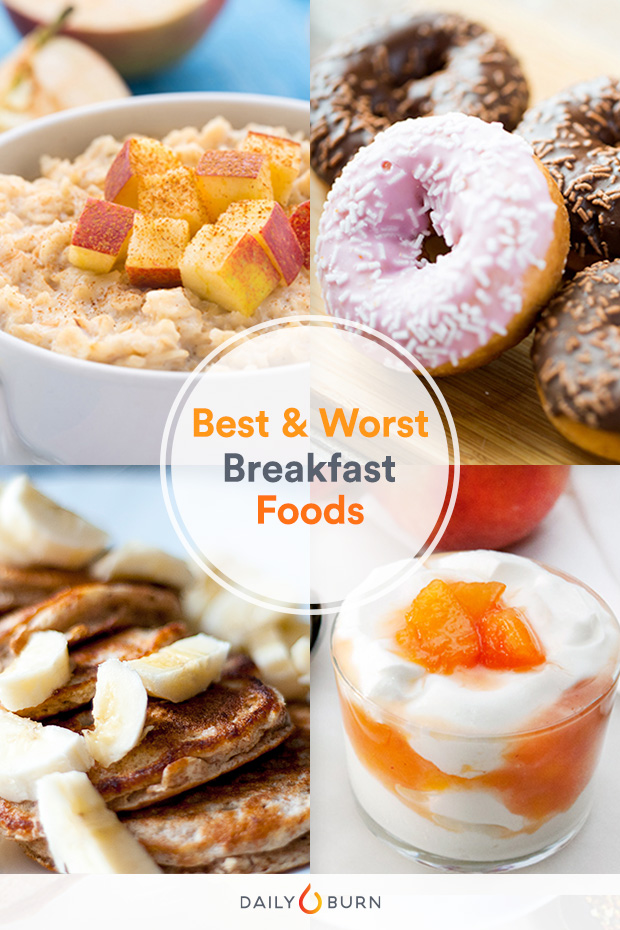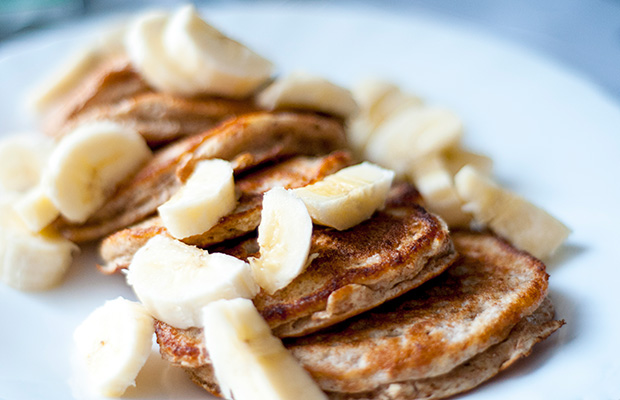
By now most of us know that we’re supposed to eat breakfast. Noshing first thing in the morning has been shown to improve concentration, provide a sustained source of energy, up the chances of consuming enough nutrients throughout the day and help maintain a healthy body weight. But not all breakfasts are created equal. (Cue scary music.)
For proof, look no further than the entries on this list, which range wildly in terms of the nutrition they provide. With the help of Samantha Mendelowitz, RD, LDN, we’ve ranked some of the country’s most popular breakfast items in order from best to worst. Simply consult this handy guide next time you’re having trouble figuring out what constitutes a truly healthy morning meal.
RELATED: 5 Healthy Fast Food Breakfast Options for Crazy-Busy Mornings
The Breakfast Foods Power Ranking: From Best to Worst

1. Egg sandwich
Provided it’s not dripping with cheese and bacon, or sitting on a bagel or croissant, the good old breakfast sandwich might actually be your a.m. ally. “This is the best option because it contains [foods from] four out of the five food groups — starch, protein, vegetable and dairy,” says Mendelowitz. It’s also incredibly filling. Use a whole-wheat English muffin and mix some vegetables (such as spinach, kale, or broccoli) in with the eggs to bolster the health benefits even further.
RELATED: 8 Quick and Easy Egg Sandwich Recipes

2. Oatmeal
Whether you’re going all out with overnight oats or rely on a microwave pack to get your fix, oatmeal is a solid choice. “[This is a] great option because oatmeal is a great source of fiber and is a whole grain,” says Mendelowitz. That means a bowl of oatmeal will provide a stable source of energy that keeps you full until lunch. You can make this breakfast even healthier by getting creative with your toppings, says Mendelowitz. Increase the meal’s fiber content by mixing in fresh, frozen, or dried fruit and/or nuts and seeds such as flax, chia and almonds. If you’re looking to up your protein intake, try adding a scoop of protein powder or some Greek yogurt to the dish.
RELATED: The Breakfast That Could Help You Eat 50 Percent Less at Lunch

3. Yogurt
Read your nutrition labels when it comes to choosing yogurt. While it’s high in protein, you’ll need to find a low-sugar (read: unsweetened) brand to make this a solid breakfast choice. Mendelowitz recommends choosing Greek yogurt (here’s how to make your own!), which is particularly high in protein, and pairing it with a few add-ins in order to prepare a breakfast that keeps you fueled all morning. Mixing in ground flax seed, chia seeds, fruit, or whole grain cereal will add more filling fiber to the meal.
4. Scrambled Eggs
Bust out your skillet: Eggs are high in protein, antioxidants, and vitamin D, which makes them a healthy and filling choice for any meal. “Go beyond the basic scrambled egg and get creative in order to increase the nutritional value of this breakfast option,” says Mendelowitz. “Enjoy them with a whole-grain English muffin [for a] filling breakfast full of fiber,” she says. Plus, if you’re cutting back on carbs this is a morning meal that will still keep you full. And you know you want to hop aboard the egg muffin trend.
RELATED: 13 Ways to Pimp Your Scrambled Eggs

5. Cereal
Cereal could rank a little higher on this list — or it could rank much lower (ahem, Cap’n Crunch). “It all depends on which cereal you choose,” says Mendelowitz. “When selecting a cereal, make sure to read the list of ingredients. You want to find a product that has whole grains listed as the first ingredient. You might also want to avoid any added sugar in the list of ingredients. Increase the fiber [content] of your cereal by sprinkling it with ground flax seed, hemp seed, chia seed or dried fruit.”
RELATED: 11 Healthy Whole-Grain Breakfast Recipes

6. Toast
Skip the bagels and opt for a slice of whole grain bread instead, Mendelowitz says. Pair it with a protein and some healthy fat (think mashed avocado, smoked salmon, cream cheese or hummus). “And don’t forget the veggies,” says Mendelowitz. “A great combination is smoked salmon, cucumber and red onion — yum!”
RELATED: Avocado Toast, Three Ways: Your New Favorite Recipe
7. Bacon
Great news, meat lovers: Your can eat bacon without fearing for your health, Mendelowitz says. (Although it’s still important to practice moderation.) It’s also a good idea to pair bacon with something fibrous. “By itself, bacon provides fat and protein,” says Mendelowitz. “But where is the fiber? Enjoy your bacon with whole-grain bread, scrambled eggs prepared with vegetables, and a cup of fresh fruit.” That will make for a truly balanced breakfast.

8. Fresh Fruit
“Fresh fruit [makes for a] wonderful snack, but on its own it isn’t considered a meal,” says Mendelowitz. While fruits do contain healthy fiber, they also contain fairly high amounts of sugar, and they don’t provide much protein. For that reason, Mendelowitz recommends pairing fresh fruit with some lean protein, whole grains and vegetables in order to make a more filling and well-rounded breakfast.
RELATED: 9 Smoothie Bowl Recipes You’ll Want to Eat Every Morning

9. Pancakes or Waffles
They may be one of the most popular foods around, but sadly, pancakes and waffles generally aren’t all that healthy. That’s because “they’re mostly simple carbohydrates,” says Mendelowitz — meaning you’re likely to feel hungry again not long after eating a meal. The good news is that there are a few things you can do to make pancakes and waffles a healthier choice: Choose whole-wheat flours; add bananas, cinnamon, and/or protein powder to the batter; and top with fresh fruit instead of sugary syrup.
RELATED: 10 Delicious Protein Pancakes Recipes
10. Donut or pastry
Back away from that croissant. “The reason [these items are] least nutritious is because [they’re] basically all simple carbohydrates,” says Mendelowitz. “Although the calorie content is appropriate for breakfast if you eat only one, [donuts and pastries] offer virtually zero fiber or protein, so they won’t keep you going throughout your morning.”
